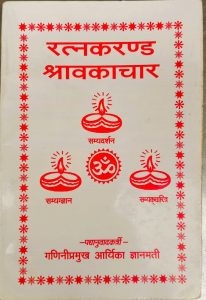The Ratna Karanda Sravakachara
(Part II)
Characteristics Of Right Knowledge

अन्यून मनतिरिक्तं याथातथ्यं विना च विपरीतात्।
निःसदेहं वेद यदाहुस्त ज्ञानमागमिनः।।४२।।
That which reveals the nature of things neither insufficiently, nor with exaggeration, nor falsely, but exactly as it is, and with certainty, that the knowers of Scripture call Right Knowledge.
प्रथमानुयोगर्थाख्यानं चरितं पुराणमपि पुण्यम्।
बोधिसमाधिनिधानं बोधति बोधः समीचीनः।।४३।।
One of the departments of] Right Knowledge is prathamanuyoga, which deals with the ideals dharma (religion), artha (wealth), kama (enjoyment) and moksha (salvation) of the soul, and which, proceeding from the standpoint of virtue, describes the lives of great men, and is a treasury of useful knowledge and subjects for meditation.
लोकालोकविभक्तेर्युगपरिवृत्तेश्चतुर्गतीनां च।
आदर्शमिव तथामतिरवैति करणानुयोगं च।।४४।।
Right Knowledge also embraces karananuyoga, which enables one to perceive, as if in a mirror, the divisions of space and the changes of time as well as the four conditions of life
1.The expression lokaloka signifies the entirety of space, that is say, toe portion occupied by the universe of matter and form as well as the region of pure space beyong it.
गृहमध्येनगाराणां चारित्रोत्पत्ति वृद्धिरक्षाङगम्।
चरणानुयोगसमयं सम्यक्ज्ञानं विजानाति।।४५।।
Right Knowledge also embraces charananuyoga, which spe cifically deals with the subject of commencement, development and maintenance of conduct prescribed for laymen and ascetics.
जीवाजीवसुतत्वे पुण्यापुण्ये च बन्धमोक्षौ च।
द्रव्यानुयोगदीपः श्रुतविद्या लोकमातनुते।।४६।।
Dravanuyoga [the fourth department of Right Knowledge] illumines, like a lamp, the true tattvas (essential principles)-jiva, ajiva, etc. virtue, vice, bondage and freedom, as well as amplifies or intensifies] the light of Sruta jnana (knowledge derived from meditation or study.)
Thus ends the second part descriptive of Right Knowledge, of the Ratna Karanda Sravakachara, composed by Sri Samantabhadra Swami.
Continued from Page 19.
2. The Jaina Siddhanta deals with living beings under four heads as follows :-
I. devagati (the (the deva kingdom) which means life in heavens.
II. narakagati (the naraka kingdom) or the condition of exist ence as a denizen of hells.
III. manushyagati, or the human kingdom, and
IV. tiryanchagati, which includes all other forms of life
